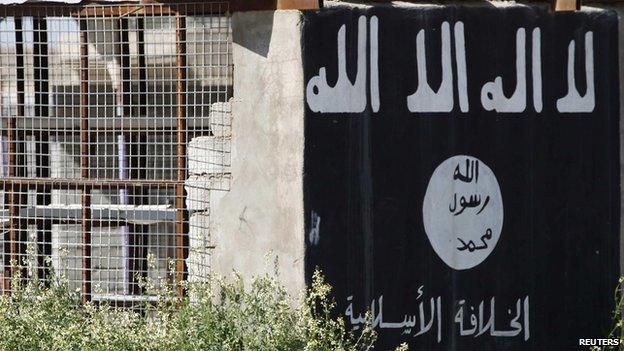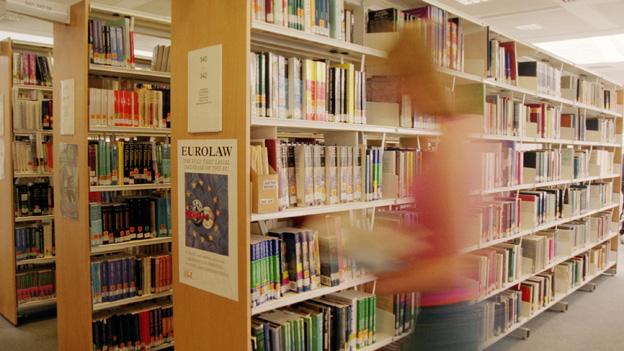Student fighters in Syria, who's to blame?
- Published

The black flag of Islamic State
Raphael Hostey, 22, is a Manchester graduate known for his Afro hairstyle and love of Twitter and Tumblr.
He is also understood to be a "commander" for Islamic State in Syria, going by the name Abu Qaqa.
His identity is said to be in a dossier handed to intelligence agencies containing the names of more than 100 "IS soldiers".
It is believed he travelled to Syria in 2013 with two other graduates of Liverpool John Moores University.
The university declined to confirm any names of former students. But Newsbeat spoke to a former counter terror officer who lectures there.
We asked Dr David Lowe how colleges are dealing with increasingly regular reports of young educated people being lured from the UK by Islamic State.
"It's hard to put the finger of blame directly on universities," he told Newsbeat.

The library at Liverpool John Moores University
In February the Counter Terrorism and Security Bill was approved, putting more responsibility on universities to stop students being drawn into terrorism.
But laws to ban extremist speakers at universities were blocked because of worries it would stop freedom of speech.
"We're talking about a very small percent, even smaller than 1 percent."
He said a very small percentage of the 700 people thought to have left the UK for Syria are former university students.
"You want to encourage freedom of thought, freedom of expression, you want to start thinking analytically... it's difficult."
He also said students may become afraid to express themselves and articulate new ideas if they feel watched too closely.
"You'll have radical speakers who will come out with statements that we don't like to hear, but that's the beauty of free speech," he explained.
"It's 'I may disagree with you, but I'm going to defend your right to say it'... but then we've got to make sure we don't go too far and it's offensive."
The National Union of Students (NUS) agree it's a delicate balance.
"Decisions around speakers can be very difficult. What is extreme to one person may not be to another, and there is a careful balance to be struck between freedom from harm and freedom of speech."
Dr Lowe says the fight to prevent radicalisation needs to begin well before university.
The three girls who left for Syria from east London in February were aged 15 and 16. This week two 17-year-olds and a 19-year-old were arrested.
So how do you tell if a young person is becoming radicalised?
"It's about helping people to say, yes, you are valued in our society, you are valued in our community, you do have a future... You don't have to go down that path of destruction."
On Tuesday, David Cameron has told the BBC the UK must "get to grips" with the changing face of youth radicalisation.
The prime minister has warned the struggle to prevent young people from joining Islamic State could go on for "not just years, but possibly decades".
Follow @BBCNewsbeat, external on Twitter, BBCNewsbeat, external on Instagram and Radio1Newsbeat, external on YouTube